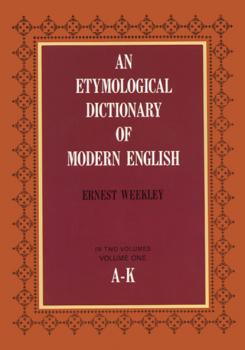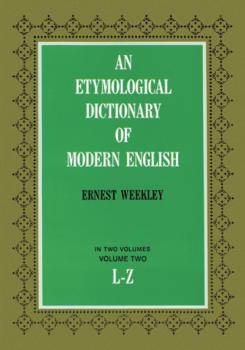Ernest Weekley
Список книг автора Ernest WeekleyThe Romance of Words (4th ed.)
"The Romance of Words (4th ed.)" by Ernest Weekley. Published by Good Press. Good Press publishes a wide range of titles that encompasses every genre. From well-known classics & literary fiction and non-fiction to forgotten−or yet undiscovered gems−of world literature, we issue the books that need to be read. Each Good Press edition has been meticulously edited and formatted to boost readability for all e-readers and devices. Our goal is to produce eBooks that are user-friendly and accessible to everyone in a high-quality digital format.
The Romance of Names
"The Romance of Names" by Ernest Weekley. Published by Good Press. Good Press publishes a wide range of titles that encompasses every genre. From well-known classics & literary fiction and non-fiction to forgotten−or yet undiscovered gems−of world literature, we issue the books that need to be read. Each Good Press edition has been meticulously edited and formatted to boost readability for all e-readers and devices. Our goal is to produce eBooks that are user-friendly and accessible to everyone in a high-quality digital format.
An Etymological Dictionary of Modern English, Vol. 1
The compiler of this dictionary of word and phrase origins and history was not only a linguist and a philologist but also a man of culture and wit. When he turned his attention, therefore, to the creation of an etymological dictionary for both specialists and non-specialists, the result was easily the finest such work ever prepared.Weekley's Dictionary is a work of thorough scholarship. It contains one of the largest lists of words and phrases to be found in any singly etymological dictionary — and considerably more material than in the standard concise edition, with fuller quotes and historical discussions. Included are most of the more common words used in English as well as slang, archaic words, such formulas as «I. O. U.,» made-up words (such as Carroll's «Jabberwock»), words coined from proper nouns, and so on. In each case, roots in Anglo-Saxon, Old Norse, Greek or Latin, Old and modern French, Anglo-Indian, etc., are identified; in hundreds of cases, especially odd or amusing listings, earliest known usage is mentioned and sense is indicated in quotations from Dickens, Shakespeare, Chaucer, «Piers Plowman,» Defoe, O. Henry, Spenser, Byron, Kipling, and so on, and from contemporary newspapers, translations of the Bible, and dozens of foreign-language authors.
An Etymological Dictionary of Modern English, Vol. 2
The compiler of this dictionary of word and phrase origins and history was not only a linguist and a philologist but also a man of culture and wit. When he turned his attention, therefore, to the creation of an etymological dictionary for both specialists and non-specialists, the result was easily the finest such work ever prepared.Weekley's Dictionary is a work of thorough scholarship. It contains one of the largest lists of words and phrases to be found in any singly etymological dictionary — and considerably more material than in the standard concise edition, with fuller quotes and historical discussions. Included are most of the more common words used in English as well as slang, archaic words, such formulas as «I. O. U.,» made-up words (such as Carroll's «Jabberwock»), words coined from proper nouns, and so on. In each case, roots in Anglo-Saxon, Old Norse, Greek or Latin, Old and modern French, Anglo-Indian, etc., are identified; in hundreds of cases, especially odd or amusing listings, earliest known usage is mentioned and sense is indicated in quotations from Dickens, Shakespeare, Chaucer, «Piers Plowman,» Defoe, O. Henry, Spenser, Byron, Kipling, and so on, and from contemporary newspapers, translations of the Bible, and dozens of foreign-language authors.



